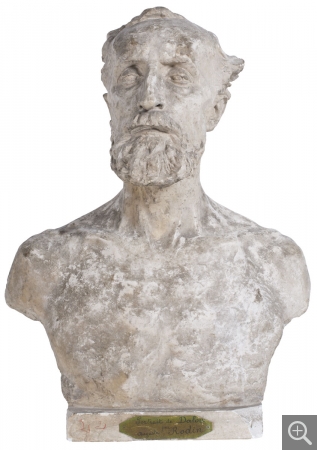Rodin, Bust of Dalou
Auguste RODIN (1840-1917)
Bust of Dalou
1883
stearin plaster
52 x 43 x 24 cm
© MuMa Le Havre / Charles Maslard
Bust of Dalou
1883
stearin plaster
52 x 43 x 24 cm
© MuMa Le Havre / Charles Maslard
The Bust of Dalou is the portrait of a sculptor by a sculptor. It is part of a series of faces Rodin sculpted of his contemporaries in the early 1880s. Jules Dalou (1838–1902) is one of the most prominent figures of monumental sculpture during the French Third Republic. In 1852, two years before Rodin, he began studying at the Petite École, a school of art and design which would later become known as the École nationale supérieure des arts décoratifs (ENSAD). In 1854, he was admitted to the École des Beaux-Arts in Paris and began to earn a living working for ornamentists. This was when he encountered Rodin, who considered him to be his first friend.
This highly realistic bust depicts Dalou in the prime of his life. Rodin used considerable freedom to deliver one of his most expressive portraits. The strong facial features, the visible bone structure and the folds of the neck convey the man's strength of character. The sculptor's lively chisel perfectly renders the proud and uncompromising man; the upright head and the high, clear forehead express the nobility of his face. The different cuts of the chest—horizontal or rounded—have resulted in several variations.
This plaster bust can be found in various French state collections (Avignon, Bagnols-sur-Cèze, Nîmes, Nice), entering as a donation from the Musée Rodin made in the 1920s. That is also how it seems to have entered the Musée du Havre, for the total acquisition price of the two other Rodin pieces—1,800 francs—corresponds to the purchase of Saint John the Baptist and The Age of Bronze. The three plaster sculptures were delivered to the museum on May 18, 1929.
This highly realistic bust depicts Dalou in the prime of his life. Rodin used considerable freedom to deliver one of his most expressive portraits. The strong facial features, the visible bone structure and the folds of the neck convey the man's strength of character. The sculptor's lively chisel perfectly renders the proud and uncompromising man; the upright head and the high, clear forehead express the nobility of his face. The different cuts of the chest—horizontal or rounded—have resulted in several variations.
This plaster bust can be found in various French state collections (Avignon, Bagnols-sur-Cèze, Nîmes, Nice), entering as a donation from the Musée Rodin made in the 1920s. That is also how it seems to have entered the Musée du Havre, for the total acquisition price of the two other Rodin pieces—1,800 francs—corresponds to the purchase of Saint John the Baptist and The Age of Bronze. The three plaster sculptures were delivered to the museum on May 18, 1929.










